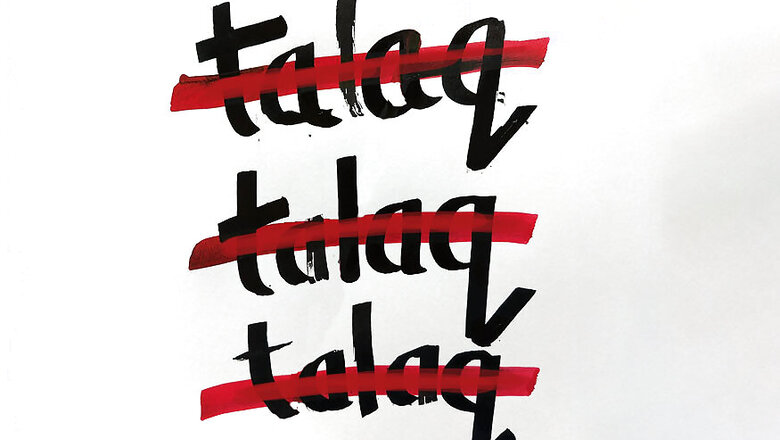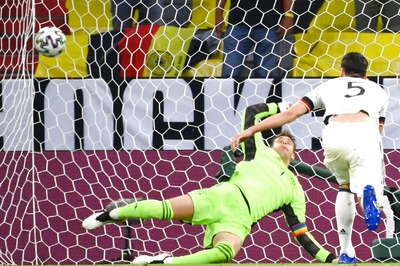
views
New Delhi: With the government introducing the Muslim Women (Protection of Marriage) Bill, 2017, questions have been raised in the Lok Sabha on the constitutional validity of the proposed legislation.
All India Majlis-e-Ittehadul Muslimeen leader Asaduddin Owaisi and Biju Janata Dal leader Bhartruhari Mahtab strongly opposed the bill, saying it “lacked legislative coherence” and was “conflicting with existing legal provisions”.
The government said it was moving the bill as it had received 66 complaints of men resorting to the practice of instant divorce despite the Supreme Court declaring it ‘void’.
So what is this practice and why is it creating such a flutter. News18 explains:
What did the Supreme Court say while invalidating the practice of triple talaq?
The historic verdict was delivered by a five-judge bench of the Supreme Court, declaring the practice of unilateral divorce (also known as triple talaq or talaq-e-biddat) unconstitutional. It held that instant talaq had no place in Islam and declared it a void form of divorce which would not result in severance of ties between husband and wife.
The court, which did not touch upon the validity of personal laws, held that instant talaq was a violation of gender justice and equality. The Supreme Court, for the first time, made Articles 25 and 26 of the Constitution of India “absolute”, despite these being subjected to restrictions.
However, the verdict did not rule that the man could be tried under a penal provision for resorting to the practice. However, there are laws present in the country that help a woman seeks justice against cruelty, adultery or desertion.
What is the new bill introduced by the government? What are its key provisions?
Under the Muslim Women (Protection of Rights of Marriage) Bill, 2017, a Muslim man who resorts to Talaq-e-Biddat or instant talaq would be jailed for three years and custody of any minor children would be granted to the affected woman.
The proposed bill has made instant divorce a non-bailable offence which can lead to an imprisonment of up to three years upon conviction. It also makes it mandatory for the husband to pay maintenance to his wife and child support towards any children.
Why does government think this bill is needed even though an SC verdict struck down the practice?
The government in the recent Winter Session of Parliament had informed the Lok Sabha that "66 cases of triple talaq were reported" despite the apex court judgment, thus proving that the verdict had failed to act as a deterrent.
The government has maintained that "the legislation would help in ensuring the larger constitutional goals of gender justice and gender equality of married Muslim women and help subserve their rights of non-discrimination and empowerment”.
Why Muslim women organisations are asking for the bill to be re-visited
Some civil society organizations have raised questions over the provisions of the bill, saying an amendment to the current legislation would have sufficed. They have also demanded that the bill be referred to a Parliamentary Standing Committee so recommendations are added to the proposed law.
“The law is intended to instill fear of the state by being able to walk into your home and incarcerate Muslim men,” said Ayesha Kidwai, a professor at the Jawaharlal Nehru University.
Activists have questioned criminalising a practice which was anyway declared ‘void’ by the Supreme Court. "When the marriage is not broken, why send the man to jail. The law will make me a divorcee," said Shabina Mumtaz, a social worker from Uttar Pradesh.
Some Muslim women have also claimed that such a bill would hamper chances of conciliation between the husband and wife. Others want it to be tried as a civil offence.
One of the Muslim organizations opposed to the bill in the current form is Bebaak Collective, which was also one of the petitioners in the case.
What is triple talaq?
First, before understanding what triple talaq is, we must understand what a ‘Nikah’ (marriage) stands for in Islam. Nikah is essentially a contract laid down in a ‘Nikahnama’ drawn between the husband and the wife. This contract can have conditions and has a compulsory ‘consideration’ (Meher) to be paid at the time of the marriage. This consideration is paid by the man to the wife, and can be at time waived off by the woman as per her own will. So the basic difference between a Hindu Marriage and a Muslim Marriage is that for Hindus, marriage is a divine sacrament whereas for Muslims, it is contract drawn between the husband and the wife.
So to explore the question of triple talaq, one must understand that in Islam, everything is followed as per Sunnah (Deeds of the prophet). Hence, most Muslim women bodies opposing 'triple talaq’ want the Muslim bodies to adopt ‘Talaq-e-Sunnah’ (Divorce as per the Prophet’s sayings and Quranic dictation) and discard ‘Talaq-e-Biddah’ (Divorce as per a later formed mode of divorce which propagates instant divorce).
What is Talaq- e-Sunnah?
According to the Prophet’s sayings, giving talaq to a wife in a fit of rage or anger is strictly prohibited. The Quran advises the husband to settle the differences through a mutual conversation as the first step. This step is known as the Fa’izu Hunna.
If the differences continue between the husband and the wife, the parties should refrain from any conjugal acts till they settle their dispute. This step of physical separation known as the Wahjuru Hunna is prescribed so that the couple re-unites. However, even if this second step fails, it is recommended that the husband must attempt to talk to the wife, make peace with her and talk about the gravity of the situation.
This third step is known as the Wazribu Hunna. However, Quran advises that even if the third step fails, the fourth step of ‘arbitration’ must be followed. In this step, a member from each of the spouses’ family is present and the parties try to make amends in the strained relationship.
It is only after all these four steps have failed that a husband pronounces the first talaq. The husband has to compulsorily wait for a wife's iddah (menses) to complete before pronouncing another talaq.
Not more than two talaqs can be pronounced during the course of iddah. Iddahs are considered to be the three monthly courses. During these three month cycles, a man cannot give his third talaq. This had been envisaged so that the couple sorts out their differences in this period.
Quran prescribes that if a woman has attained the age of menopause then the period of iddah is three months, whereas if a woman is pregnant, then the period of Iddah would be till the child is born or the termination of pregnancy.
If the differences still persists then the third talaq is pronounced, after which the relations between the husband and the wife are severed. Hence, the women groups who are claiming to revive this practice are only vouching for the fact that they get the maximum time to sort out their differences which is often not possible in an ‘instant talaq’.
What exactly is this ‘instant talaq’? How is it different from Talaq-e-Sunnah?
Instant Talaq is something which has its genesis is women being divorced through SMS or over a mere phone call. This instant talaq is essentially ‘Talaq-e-Biddah’. ‘Biddah’ means innovation and essentially all Muslims are advised against introducing ‘biddahs’ in their religion.
This practice of talaq was first promoted by Caliph Umar, and is staunchly opposed by all the petitioners who have approached the Supreme Court for a reform in the case of triple talaq. However, the Muslim Personal Law Board has not still spoken up on the issue and claims that this can be sorted out internally.
Dr. Asma Zehra, an executive member of the All India Muslim Personal Law Board, was questioned about this during a recent press conference and said, “We have left it for our Ulema (scholars) to decide what is best for us.” However, this answer is far from the truth, as something which is not mentioned in the Qur’an or is a part of the Sunnah can never be justified as a lawful act by a Muslim.
Can a man marry his wife after pronouncing the third talaq?
No. After the third talaq, a woman is supposed to marry another man, consummate the relationship, and only after following the original procedure of Talaq-e-Sunnah, will she be able to marry the former husband again.
This practice is known as the ‘Nikah Halala’, and many Muslim women have condemned this practice as barbaric and it assumes more importance, in case the talaq is given as Talaq-e-Biddah.
Women have often described it as a barbaric practice and there are demands to abolish it.
Do the women have any right to divorce the husband in Islam?
There are broadly two methods under which a wife can claim divorce. One is Talaq-e-Tafweez and the other is Talaq-e-Khula. Under Tafweez, the husband ‘may’ delegate his power to give talaq to his wife or any third party.
This right has to be in the form of a contract with conditions, like, ‘if a man marries again’ then there can be a divorce, etc. But a contract will not be without conditions or be absolute.
The second one is Khula. This is a divorce which is at the ‘request’ of the wife. In this case the woman has to make an offer of divorce to the man. The man must accept the offer with consideration, which often means the woman, has to give back the Meher taken during marriage. After these two steps, a Khula is granted. The woman often approaches a qazi-court as well to demand a Khula from the man. There needs to be an execution of a Khulanama.
But something which needs to be broadly observed is that in both the cases, it’s only a request or a husband's wish to draw up a contract to give the wife an option to divorce him. Thereby, putting the husbands first, and somehow lacking in achieving gender equality in this regard.
Are there any other Islamic countries which have taken reforms in the mode of talaq?
Let’s begin with our neighbour Pakistan. Pakistan in 1961 had passed the ‘The Muslim Family Laws Ordinance’. According to this law, if a man wishes to divorce his wife, he will pronounce talaq and approach the Chairman of the Union Council which is appointed by the state, and give him a written notice and forward the same to his wife.
Within 30 days of the receipt of the notice, the Chairman will set up an Arbitration Council which shall consist of himself, a representative of each of the spouse, and the boar would try to bring reconciliation. If any individual tries to bypass this legislation then they will be punished with simple imprisonment for a year or a fine which may extend to Rs 5,000 or both.
Another example is Morocco, which has a majority population of Islam. They have the Moroccan Family Code (Moudawana) passed in 2004. The code aims at putting both husband and wife on the equal footing, thereby prohibiting the man from pronouncing divorce unilaterally except when the procedure is being supervised by someone.
The code also attempts to bring arbitration and conciliation between the parties concerned. The code further states that if a man chooses to still divorce a wife, then a divorce can only be granted only if the husband pays off all the due rights held by the wife and the children.
Like Morocco, Algeria, Indonesia, Iran and Tunisia have similar legislations which do not recognise a divorce given by a husband unilaterally, and compel the parties to resort to a court of law.



















Comments
0 comment